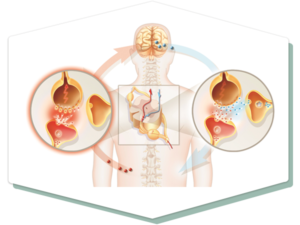Does Gabapentin work for nerve pain?

📖Introduction
 Gabapentin is one of the few medications that can effectively treat nerve pain. The medication works by blocking the effects of certain neurons, which helps to reduce the pain caused by damaged nerves. When used as directed, gabapentin is effective in treating both chronic and acute nerve pain.
Gabapentin is one of the few medications that can effectively treat nerve pain. The medication works by blocking the effects of certain neurons, which helps to reduce the pain caused by damaged nerves. When used as directed, gabapentin is effective in treating both chronic and acute nerve pain.
However, there are risks associated with this drug including stomach ulcers and rhabdomyolysis (myoglobinuria)—that make it less desirable than other options for treating nerve pain.
Gabapentin was first created to treat epilepsy, but researchers have found it also helps relieve nerve pain.
It’s now used for other conditions like fibromyalgia, migraines, and restless leg syndrome.
Gabapentin is not addictive and there are no studies to show whether it causes dizziness or sleepiness in people who take it regularly.
Recently, gabapentin has received attention as a pain reliever for diabetic neuropathy, post-herpetic neuralgia, and migraine prevention.
💆🏽♀️Uses of Gabapentin for treating nerve pain
This is a medication that has been used to treat nerve pain and other types of nerve damage. It’s often prescribed for post-herpetic neuralgia (shingles), diabetic neuropathy, and migraine prevention.
However, there are some limitations to this drug: it may not work as well for all kinds of nerve pain or all types of nerve damage; it may also cause side effects like dizziness or drowsiness.
Though gabapentin is often prescribed because it doesn’t have some of the side effects that other pain relievers do (such as addiction or risk of stomach ulcers), it does carry some dangers.
Side effects of the drug include blurred vision or swelling of the face, hands, or feet. If you take too much of this drug for long periods it could cause seizures.
📜Also Read: Can You Take Pain O Soma 500mg for Muscle Pain?
💢Work procedure of Gabapentin to cure nerve pain
 Gabapentin is a drug that can be used to treat nerve pain and epilepsy. It’s also used to treat bipolar disorder and postherpetic neuralgia (a type of neuropathy). While gabapentin can help relieve nerve pain, there are safer alternatives that help with the same symptoms.
Gabapentin is a drug that can be used to treat nerve pain and epilepsy. It’s also used to treat bipolar disorder and postherpetic neuralgia (a type of neuropathy). While gabapentin can help relieve nerve pain, there are safer alternatives that help with the same symptoms.
Medication is used to treat certain types of chronic pain, including neuropathic pain (pain caused by damaged nerves). This medicine works by blocking neurotransmitters called excitatory amino acids, which are involved in transmitting messages between neurons.
These chemicals play a role in many different bodily processes, including muscle contraction, memory formation, and temperature regulation.
In people with neuropathy, these chemicals may become overactive, causing pain signals to travel along the same pathways as normal pain signals.
These pills block these chemicals, reducing the amount of pain experienced. Gabapentin is a good first-line treatment for neuropathic pain, and it works best in combination with other treatments.
It can be used alone to treat nerve pain but is not as effective as some other medications. This isn’t a cure for nerve pain; it only offers relief by reducing the symptoms of the condition.
This is not a specific medicine to treat nerve problems, there are many specific medicines available for this type of health issue. Medicines like Pain o Soma 350 can be helpful. The generic element in Pain O Soma 350 tablets is not the same as gabapentin but the working and results are almost the same.
💊How to take gabapentin?
The recommended dosage of gabapentin is 300 mg three times daily. You should not exceed this amount unless directed by your doctor. If you have any side effects while taking gabapentin, contact your physician immediately.
⭕Side Effects
Gabapentin is a medication that can improve nerve pain, but it doesn’t always work well. It’s best to try other treatments before trying this tablet again. The first side effect of gabapentin is usually drowsiness and sleepiness, which might be worse than the pain itself.

Side effects may occur if you take excess gabapentin than what you can tolerate. Common side effects include dizziness, nausea, vomiting, diarrhea, headache, fatigue, sleepiness, and weight gain.
Other less common side effects include blurred vision, dry mouth, constipation, and difficulty urinating. Higher doses of medicines can also cause these problems. But if you only have muscle pain then doctors may recommend you to use Pain o soma 500.
🔊Conclusion
Gabapentin also appears to help treat postherpetic neuralgia caused by shingles. The pain usually lasts six months after the infection is gone.
Gabapentin is more effective than a placebo at treating postherpetic neuralgia, which is why some products include this medication in their products for shingles and other nerve pain.
While medicine can be a useful pain reliever, it is not without risk. While some patients report relief from nerve pain, others have reported serious side effects such as dizziness and even mental changes.
It’s important to speak with your doctor before taking this medication if you are interested in reducing your pain or need an alternative form of treatment. These medicines are available on the Pillsforcare website.